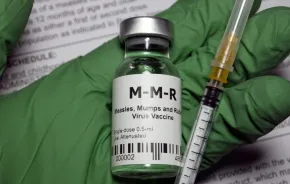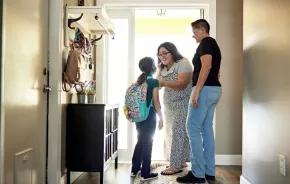
Meeting her husband’s college roommate — a former college partier — helped Alison Krupnick frame the way she talked to her children about alcohol.
“He’d tell his [teenaged] kids, ‘Ask yourself whether you are doing what you want to do and make sure you feel safe and comfortable,’” she says. “I was struck by how he instilled the need to make their own decisions rather than letting friends decide.”
When their own teen daughters began attending parties, Krupnick and her husband also wanted to arm them with practical information about alcohol. They began the conversation with easy-to-understand facts, such as how many ounces are in a shot of liquor, what “proof” means and the impact of body weight on a person’s tolerance.
With her older daughter now in college, Krupnick thinks their family’s approach was effective. “Our daughter understands how to keep herself safe and healthy because we discussed alcohol use honestly and practically before she left home,” she says.
Creating your own family’s guidelines about alcohol can be tricky, particularly when everyone you know spouts a different philosophy. There’s the family with the strict no-drinking-ever policy, the friends who let their kids drink wine on special occasions and the neighbor who’s OK with his teen drinking a beer with dinner.
Wherever you fall, there’s no excuse for avoiding a talk about alcohol. An estimated 71 percent of 10th-graders think it’s easy to get alcohol, according to a 2016 National Institutes of Health survey. But whether or not they’ll reach for a drink often depends on what their parents think. A 2016 survey of Washington state teens found 57 percent of 10th-graders drink if their parents don’t think it’s wrong. That number is only 15 percent if a kid knows their parents wouldn’t approve.
“Parents do really need to have an agreement with [their] kids [about drinking],” says Dr. Yolanda Evans, an adolescent medicine physician at Seattle Children’s Hospital.
Coming to an agreement
While formulating a family policy, Evans says, parents should make safety their main concern. “Really think about what is going to be a hard and fast rule. For example: ‘If you drink, you don’t drive — ever,’” says Evans. Talk to your kids about your expectations of their behavior well ahead of time and discuss consequences, too.
It will also help to share facts about alcohol consumption, says Evans. A few examples: Drinking alters the brain as it develops, a process that isn’t fully done until age 25. Drinking impairs judgement, which puts people in potentially unsafe situations that they may not be in if sober. Alcohol is a depressant — it depresses basic responses to life, and drinkers can black out or pass out — and combining it with drugs, including marijuana, can be extremely dangerous.
“Talking with our kids about why some teens chose to drink provides a chance to discuss scenarios before they happen,” Evans adds. “Help your kids weigh the pros and cons, so they can say, ‘Oh man, the downsides are not something I want to take on.’”
Psychologist Laura Kastner encourages parents to start these conversations as early as middle school. And if you discover an episode of drinking — say, beer at a sleepover — take a firm stance. Meet with the parents of any other kids involved and decide consequences as a group.
“[Then, when your kid is in high school], you don’t change your position, but you also talk about safety, harm reduction and good decision making,” says Kastner, who is a clinical professor of psychiatry at the University of Washington. “Discuss how your child’s greater independence and maturity mean that they will increasingly be in a role of self-governor over their actions.”
My first principle is safety, so if you encounter trouble, I will always support you, even if you start drinking before age 21.
What does that look like? Kastner says: “You say, ‘I would like you to never break the law and not drink before age 21, but I realize that you will be making your own decisions when you are out with friends. My first principle is safety, so if you encounter trouble, I will always support you, even if you start drinking before then.’”
Such support means establishing a “no questions asked” phone call policy, says Kastner. This allows kids to call their parents if they do get drunk (or in another messy situation), with all the people involved holding off on a conversation until 24 hours have passed. When you do talk about what happened, be sure to discuss the fact that there are always consequences for irresponsible actions, but that learning from mistakes is the goal and that your child’s reaching out for help is a positive step.
But, should you teach your kids how to drink?
Some parents tolerate drinking at home, including Dr. Marjorie Rosenblatt, who is the mother of three children. “[My kids] can have one alcoholic beverage [at home] as long as they’re not driving,” she writes on the parenting blog Grown & Flown. “This contract also includes a discussion of the myriad risks associated with drinking and the statement that I prefer they opt out.”
This “one-drink deal” works for her family, she says. “I’ve been able to maintain open lines of communication with my 10th-grader,” she says. “She feels comfortable confiding in me both her actions and those of her counterparts.”
Local parent educator Sheri Gazitt agrees with Rosenblatt’s key point: We must have open lines of communication with our kids. “We can achieve this, though, without allowing drinking in the home,” says Gazitt. “It’s all about the language and the nuance of how to present our point of view to our kids. We must leave room for a conversation rather than lecturing.”
A teen life coach and founder of Teen Wise, Gazitt believes conversation topics should include how alcohol can be abused and overconsumed.
“Statistics show that teens who have alcohol before the age of 15 are four times more likely to become alcoholics than people who wait unto the legal drinking age,” she says. “If you have a genetic predisposition to alcoholism, that likelihood increases.”
Remember that kids need to know how to manage their emotions before they’re introduced to alcohol, explains local parent educator Yvonne-Monique Aviva.
“Help your kids build their strategies for dealing with anger, pain and uncomfortable situations,” says Aviva, who is a consultant for parents about their kids’ social, emotional and educational development. “[For some people,] alcohol is going to feel amazing, but it could also ruin their lives. Kids are surrounded by media that tells them taking substances is a good way to manage emotions by checking out.”
And when it’s your kid who’s drunk?
Of course, these conversations all sound good in theory, but what happens when it’s your kid who comes home drunk? First, wait until everyone has cooled down (and sobered up) before you deal with a specific incident.
“Start with the facts. For example: ‘I noticed our vodka bottle is empty. Have you been drinking?’” says Gazitt. If your child says yes, ask more questions. Are they drinking for fun or to relieve stress? How often? Let them know you’re on their side, making it a conversation about helping them figure out a plan so that alcohol doesn’t become a problem, she adds.
And if they say no? Gazitt recommends gently saying that you don’t believe it and stating why you don’t (e.g., you found empty cans in your kid’s room).
It’s good to remember that misbehavior is always an attempt for connection with a caring adult. “Let them know you’re OK with their imperfection and remind them of how lovable they are,” says Aviva.
It can help to get your child’s school involved, she adds; prevention and intervention counselors can do a GAIN (global appraisal of individual needs) assessment, which can give a big-picture view of how a kid is doing. Many times, kids will feel relief when an issue is finally addressed, says Aviva.
Wendy Nelson* says her son’s school counselor called her and her husband during their son’s sophomore year; he had agreed to tell his parents that he was getting help for depression. Another year passed before he told them he had been drinking and using drugs since middle school.
None of this has been easy, says Nelson. “My husband and I have had to let him navigate many bumps on his own while we work to keep him safe and get him the resources [academic help, counseling and medication] he needs,” she says.
After two decades of helping families navigate similar difficult situations, Kastner says the quality of relationships between parents and their kids matters most.
“Just like sex, talk about alcohol often,” Kastner says. “Aim to be a cool-headed parent: trustworthy and willing to collaborate to solve problems and accept your children exactly as they are, while aiming to build social situation competence and prioritizing safety.”
“It’s really normal for kids to take risks and make mistakes,” says Evans. “[But] research shows that kids do want to talk with someone about their own risky behavior.”
*Name has been changed for privacy.
Parenting Tips When It Comes to Alcohol
— Dr. Yolanda Evans, Seattle Children’s Hospital |











